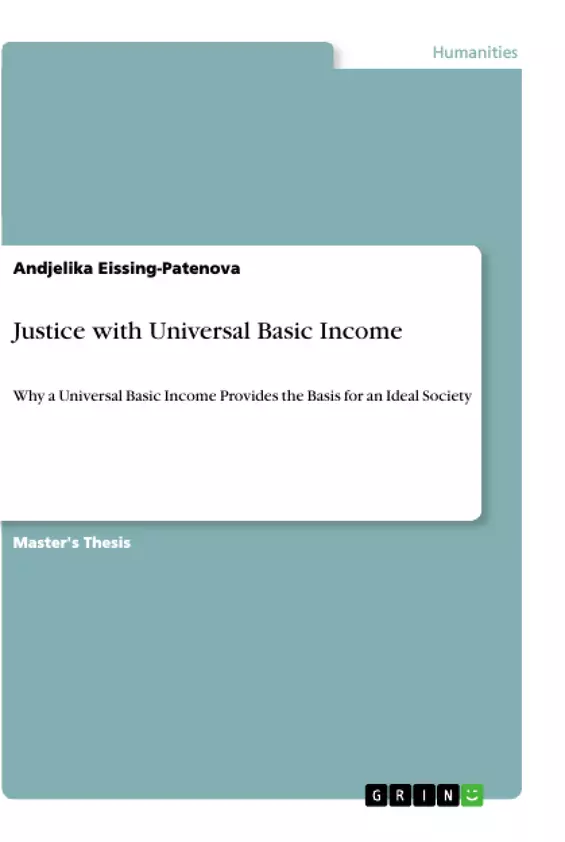The author argues for the claim that a universal basic income (UBI) provides the basis for an ideal society, i.e. one that provides the greatest justice possible. By first analyzing four key approaches in political philosophy – utilitarian, libertarian, meritocratic and egalitarian distributive principles – it will turn out that the latter are best suited for establishing an ideal society.
In particular, John Rawls’ egalitarian principles of justice guarantee for all members of a society equal liberty rights and additionally claim rights, which can compensate for the inequalities resulting from the destiny of birth. Then, the paper shows why a UBI can realize Rawls’ distributive principles particularly well and why therefore, a UBI provides the basis for an ideal society. In the last part, different funding sources for a UBI will be assessed philosophically. A (negative) income tax system and a consumption tax system are analyzed along the three criteria of fairness, simplicity and efficiency. Finally, a mixed model is discussed, which seems to be the most promising strategy for funding a UBI. However, since a (negative) income tax is not an optimal solution, a mixed funding model should rather contain a consumption tax and further tax sources.
Inhaltsverzeichnis (Table of Contents)
- INTRODUCTION
- AN IDEAL SOCIETY
- WHAT IS AN IDEAL SOCIETY?
- SETTING UP PRINCIPLES OF JUSTICE
- FIRST APPROXIMATION
- THOUGHT EXPERIMENTS
- A HYPOTHETICAL CONTRACT
- MORAL JUSTIFICATION
- MORALLY IRRELEVANT FACTORS
- DISCUSSING DISTRIBUTIVE PRINCIPLES
- UTILITARIANISM
- LIBERTARIANISM
- MERITOCRACY
- EGALITARIANISM
- UNIVERSAL BASIC INCOME FOR AN IDEAL SOCIETY
- WHAT IS A UBI?
- UBI REALISES RAWLS' PRINCIPLES OF JUSTICE
- DIFFERENCE PRINCIPLE
- FAIR EQUALITY OF OPPORTUNITY
- FUNDING SOURCES
- INCOME TAX
- CONSUMPTION TAX
- MIXED MODEL
- CONCLUSION
Zielsetzung und Themenschwerpunkte (Objectives and Key Themes)
This Master's Thesis argues for the claim that a universal basic income (UBI) provides the basis for an ideal society. The thesis aims to demonstrate the feasibility of a UBI by analyzing its compatibility with key principles of justice and exploring various funding models.
- Establishing the Principles of Justice for an Ideal Society
- Assessing the UBI's Compatibility with Rawls' Egalitarian Principles
- Analyzing Different Funding Models for a UBI
- Evaluating the Fairness, Simplicity, and Efficiency of Various Funding Models
- Exploring the Potential of a Mixed Funding Model for a UBI
Zusammenfassung der Kapitel (Chapter Summaries)
The introduction outlines the concept of an ideal society, emphasizing the role of a UBI in achieving this ideal. The thesis establishes a framework for analyzing the principles of justice that underpin an ideal society, utilizing thought experiments and exploring four key approaches to distributive justice: utilitarianism, libertarianism, meritocracy, and egalitarianism.
The third chapter introduces the concept of a UBI and delves into its compatibility with Rawls' egalitarian principles of justice, focusing on the Difference Principle and the principle of fair equality of opportunity.
The fourth chapter analyzes different funding sources for a UBI, evaluating income tax, consumption tax, and a mixed model based on criteria such as fairness, simplicity, and efficiency.
Schlüsselwörter (Keywords)
The key terms and concepts explored in this thesis include universal basic income (UBI), ideal society, principles of justice, egalitarianism, John Rawls, Difference Principle, fair equality of opportunity, funding models, income tax, consumption tax, mixed model, fairness, simplicity, efficiency.
- Quote paper
- Andjelika Eissing-Patenova (Author), 2020, Justice with Universal Basic Income, Munich, GRIN Verlag, https://www.grin.com/document/934428



